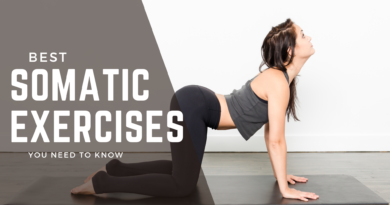Warning: These 5 ‘Healthy’ Habits Are Actually Hurting You
Are you unknowingly harming your health? In our quest for a healthier lifestyle, we often adopt habits that we believe are beneficial. However, some of these seemingly innocent routines might be doing more harm than good. This blog post will explore five surprising health habits that could be secretly damaging your well-being. Whether you’re in your 20s or approaching your 60s, it’s crucial to be aware of these hidden dangers and make informed decisions about your health.
The Illusion of Healthy Habits
We all strive to lead healthy lives, but sometimes our efforts can backfire. It’s easy to fall into the trap of following trendy health advice without fully understanding its long-term effects. Let’s dive into the world of deceptive health habits and uncover the truth behind practices that might be slowly chipping away at your well-being.
1. Overdoing Your Workout Routine
The Appeal of Intense Exercise
Exercise is undoubtedly beneficial for our health. It helps maintain a healthy weight, improves cardiovascular health, and boosts mood. Many people believe that more exercise always equals better health. This mindset has led to the popularity of high-intensity workouts and extreme fitness challenges.
When Too Much Becomes Harmful
While regular physical activity is essential, overdoing it can have serious consequences. Excessive exercise can lead to:
- Chronic fatigue
- Increased risk of injuries
- Weakened immune system
- Hormonal imbalances
- Mental burnout
Finding the Right Balance
The key is to find a balance that works for your body. Here are some tips:
- Listen to your body and give it adequate rest
- Incorporate rest days into your workout schedule
- Mix high-intensity workouts with low-impact activities
- Stay hydrated and maintain a balanced diet
- Consult with a fitness professional to create a personalized plan
Remember: Quality over quantity is crucial when it comes to exercise. Your workout routine should energize you, not drain you.
2. The Dark Side of “Healthy” Snacking
The Allure of Health Food Marketing
Walk down any grocery store aisle, and you’ll be bombarded with products labeled as “healthy,” “natural,” or “low-fat.” These snacks seem like the perfect solution for those trying to maintain a balanced diet while satisfying their cravings.
Hidden Dangers in “Healthy” Snacks
Unfortunately, many of these so-called healthy snacks are wolves in sheep’s clothing. Here’s why:
- High sugar content: Many low-fat snacks compensate for flavor by adding extra sugar.
- Artificial additives: Some “natural” snacks contain artificial preservatives and flavors.
- Calorie-dense: Healthy-sounding snacks like granola or trail mix can be surprisingly high in calories.
- Misleading portion sizes: Packaging often displays unrealistic serving sizes, leading to overconsumption.
Making Smarter Snacking Choices
To avoid falling into the healthy snacking trap:
- Read nutrition labels carefully
- Choose whole, unprocessed foods when possible
- Prepare your own snacks at home
- Be mindful of portion sizes
- Opt for fruits, vegetables, and nuts as natural snack options
Tip: Don’t be fooled by clever marketing. A snack labeled as “healthy” isn’t always good for you.
3. The Perils of Excessive Hydration
The “More Water, Better Health” Myth
We’ve all heard the advice to drink eight glasses of water a day. Some health enthusiasts even advocate for drinking as much water as possible, believing it will flush out toxins and improve overall health.
When Hydration Becomes Harmful
While staying hydrated is crucial, overhydration can be dangerous. Here’s what you need to know:
- Electrolyte imbalance: Drinking too much water can dilute essential electrolytes in your body.
- Hyponatremia: This condition occurs when sodium levels in the blood become dangerously low due to excessive water intake.
- Kidney strain: Constantly overhydrating can put unnecessary stress on your kidneys.
- Disrupted sleep: Drinking too much water before bed can lead to frequent night-time urination, affecting sleep quality.
Finding Your Hydration Sweet Spot
To maintain proper hydration without going overboard:
- Listen to your body’s thirst signals
- Consider factors like climate, activity level, and diet
- Pay attention to the color of your urine (pale yellow is ideal)
- Eat water-rich foods to contribute to your daily fluid intake
- Consult with a healthcare professional if you have concerns about your hydration needs
Remember: Your body is excellent at regulating its water needs. Trust your thirst and don’t force yourself to drink excessive amounts of water.
4. The Downside of Obsessive Cleanliness
The Appeal of a Germ-Free Environment
In our modern world, especially post-pandemic, the desire to maintain a spotlessly clean environment is stronger than ever. Many people believe that eliminating all germs is the key to staying healthy.
When Cleanliness Becomes Counterproductive
While good hygiene is important, being overly clean can actually harm your health:
- Weakened immune system: Exposure to some germs helps build a strong immune system.
- Increased risk of allergies: Over-sanitized environments may contribute to the development of allergies and asthma.
- Disrupted skin microbiome: Excessive cleaning can strip away beneficial bacteria on your skin.
- Increased exposure to harmful chemicals: Overuse of cleaning products may expose you to potentially toxic substances.
Striking a Balance with Cleanliness
To maintain a healthy level of cleanliness:
- Focus on regular, basic cleaning rather than constant disinfecting
- Use natural cleaning products when possible
- Allow children to play outdoors and get dirty occasionally
- Practice good hand hygiene without going overboard
- Embrace the concept of “good” bacteria in your environment
Fact: A little dirt won’t hurt. Exposure to diverse microorganisms can actually boost your immune system.
5. The Hidden Dangers of Sleep Procrastination
The Lure of Late-Night Activities
In our busy lives, many people find themselves sacrificing sleep to squeeze in more work, entertainment, or social media scrolling. This habit, known as “sleep procrastination,” might seem harmless but can have serious health consequences.
The Health Toll of Inadequate Sleep
Consistently pushing back your bedtime can lead to:
- Increased risk of obesity and diabetes
- Weakened immune function
- Impaired cognitive performance
- Higher risk of cardiovascular diseases
- Mood disorders and increased stress levels
Reclaiming Your Sleep Schedule
To break the cycle of sleep procrastination:
- Set a consistent sleep schedule and stick to it
- Create a relaxing bedtime routine
- Limit screen time before bed
- Make your bedroom a sleep-friendly environment
- Practice time management during the day to avoid late-night work sessions
Quality sleep is not a luxury; it’s a necessity. Prioritizing sleep is one of the best investments you can make in your health.
Conclusion: Rethinking Your Health Habits
As we’ve explored these five shocking health habits, it’s clear that good intentions don’t always lead to positive outcomes. The key takeaway is the importance of balance and moderation in all aspects of health. What works for one person may not work for another, and it’s crucial to listen to your body and make informed decisions.
Moving Forward with Healthier Habits
To truly improve your health:
- Question popular health trends and seek evidence-based information
- Consult with healthcare professionals for personalized advice
- Make gradual, sustainable changes rather than drastic overhauls
- Pay attention to how your body responds to different habits
- Remember that health is multifaceted, involving physical, mental, and emotional well-being
By being aware of these potentially harmful habits and making conscious choices, you can create a truly healthy lifestyle that supports your overall well-being. Don’t be afraid to challenge common health beliefs and find what works best for you. Your body will thank you for it in the long run.
Final thought: True health is about finding balance, not extremes. Listen to your body, stay informed, and make choices that genuinely support your well-being.
Remember, your health journey is unique to you. What matters most is finding a sustainable approach that makes you feel energized, balanced, and truly healthy. By avoiding these secretly harmful habits and adopting a more mindful approach to health, you’re setting yourself up for a longer, happier, and healthier life.




